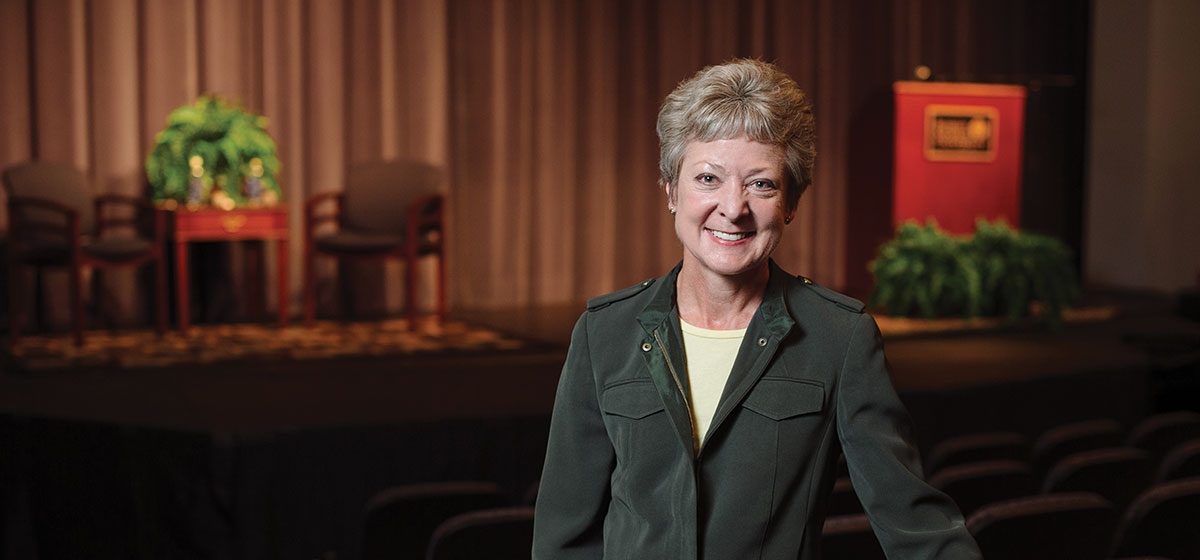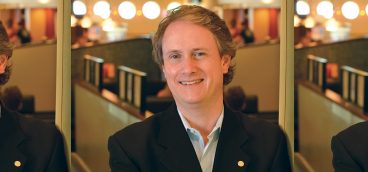Kim Tillotson Fleming

Editor’s Note: Hefren-Tillotson CEO Kim Tillotson Fleming spoke recently at the quarterly CEO speakers series hosted by Pittsburgh Quarterly and Robert Morris University on its Moon campus. The following is her speech, somewhat abridged.
I am a student of leadership.
The more I know, however, the more I realize I don’t know. As a leader, I’ve had some moments of recognition about what leadership means, where I’ve said, “I never realized this.” Every time I’ve had that “ah-ha” moment where I think I’ve come up with something new, I read something from 120 years ago and realize, “that’s not a new thought; somebody had that years ago.”
When I was in elementary school and high school, I thought history was one of the most boring subjects. But the truth is that most of the important lessons about leadership and life are already there if you study history; you don’t have to recreate them.
I am very lucky because I don’t feel like I’ve ever worked a “job”. I love what I do and if I didn’t, I would change it. As you pursue careers, being able to come in and feel proud about what you’re doing is extremely important. Having foundational beliefs that you stand on is also important. Effective leadership starts by being a good student of those around you and recognizing that history has already provided a lot of this foundation.
I’m also a believer of leaving a legacy. There are so many people who’ve contributed to Pittsburgh and continue to do so. The important legacies have a lasting impact that is truly never forgotten. Learning lessons from the stories of those individuals and applying them in your life so that you’re creating your own legacy is one of the best things you can do in life. These are the kind of legacies that last, and they have a lot to do with another point, which is to have a vision. People who have a vision are able to see opportunities to make a difference. It’s important to have a sense of real purpose around that vision.
There are people in our industry who have visions, and sometimes those visions can be off-base. Making money for selfish or unethical purposes has been the cause of many downfalls in our industry. Leaders with true vision and purpose outside of themselves are the kind of leaders who have had a lasting impact on our country. Steve Jobs explained it well when he said, “Great companies must have a noble cause. Then it’s the leader’s job to transform that noble cause into such an inspiring vision that it will attract the most talented people in the world to want to join it.”
Our company, Hefren-Tillotson, was founded in 1948. My grandfather, Arthur Hefren, was the first in his family of 13 children to go to college. He started the company as the Arthur Hefren Company, and it was comprised of three people for most of the time that he was with it. My father, Bill Tillotson, was also the first in his family to go to college. His parents had eighth-grade educations, but they truly believed in working hard.
My father had many stories about the importance of working hard. One of his first jobs was on a road crew. My grandfather, Willard Tillotson, was the superintendent of highways for Crawford County, and he taught my father the importance of working hard and doing your best. When they had breaks, my father was often the first to get back to work, and the other people on the crew didn’t like that. It wasn’t in his work ethic to idly sit and take advantage of the system. The importance of hard work was one of the many values instilled in our family.
My father passed away two years ago. He was 82 and actually was in the office two days before he passed away from a stroke. He worked his entire life, and it was truly his passion. He joined my grandfather at a time when he had very few resources, but he had a vision to make the company grow. From a company of three in the early 1950s, we now have about 170 employees and just opened our sixth office, in Greensburg.
Hefren Tillotson has a great group of people who are focused on our mission and understand our principles and values, and we try to reinforce that every day. We reinforce it as we hire people and as we review their performance. As we interview people, they have to fit the culture and really have a belief that what we stand for is something that is important to them. I feel so lucky to be working with a group of people who have so many talents and diversity and bring so much to the table every day. It takes a lot of work on everyone’s part to appreciate this kind of culture and to keep it going through three generations.
I was fortunate to work for Hefren-Tillotson when I was in high school (as a Girl Friday). I really didn’t know much about the securities business before I started working there that summer. Later, when I attended Northwestern, I thought I would like to be a physical therapist. I took my pre-med classes and realized I didn’t like things like organic chemistry, but I liked the business world a lot. I recently found a letter that I had written to my father in my first semester telling him I’d like to talk to him about my career. I’m sure we had a talk, because in my second semester, I became an econ major and have never regretted that decision.
My position with the company is not a job; it’s truly been a passion to be able to be in this setting with family values. And those family values carry out through our whole company. Everyone understands them. The expectation to work hard has never changed, and that’s really been true for every employee we’ve had. Today, what’s most fun is actually seeing young people come in and helping them develop skills and figure out what they’re all about. When you do that and help someone find their passion, you really don’t have to give them a lot of guidance. You might have to steer them a little, but if you can give them the opportunity to use their talents and their gifts and really love what they do, then you just give them a little bit of guidance along the way. Some days, I feel like the orchestra conductor, where I’m up in the front and I have all the right people in the seats. I set the vision and tell them what the music is. But then you get them all playing in the right direction, and it’s amazing to see what happens.
We not only talk about values, we really live them. When we created them and put them in writing in 1998, we had four core values. The first was deep respect for the individual, and that respect for the individual applies to every employee, to every client that we have, and to everybody that comes in contact with us as a company. We expect it, and we hold people accountable to it.
The second is integrity in thought and action. We really talk about that in everything we do. In our industry, we’re dealing with people, their money and their lives, and hopefully we have an impact on them. So there’s no compromising on integrity in thought and also in action.
Third, we believe in teamwork supported by a family-oriented culture. When someone joins our company as an employee or as a client, we welcome them to the Hefren-Tillotson family. It’s amazing how that comes back. Clients will say, “I’ve been part of your family for five years, 10 years, 15 years.” They hear that language, and we believe in it. Fourth is relentless commitment to excellence. We believe in continual learning, and we want to support people as they go through their careers and help them learn, develop and hopefully find opportunities that keep them here for a long time. It’s one of the reasons we have such low turnover.
My father was a great mentor for people, and when he passed away, it did have quite an impact on everyone. We thought it was important for people to know that even though he’s not here anymore, those values will continue. One of the things we created was called “Lessons From the Life of Willard Tillotson,” and we broke it down into three categories: personal lessons, lessons about character, and business lessons.
We talk about those lessons frequently, and I think they’ve made an impact on the quality of life of our people. No. 1: Family is the most important thing; never give up on them. No. 2: Material things can be replaced, but people can’t. Most important: Everyone deserves respect. Thank others often, and don’t take yourself too seriously or ever think you’re too important. Humility is a big part of what we’re about. We all have egos, but hopefully they’re not so big that it stops us from being able to operate the way we want.
When it comes to character, especially in financial services, do what is right—integrity in thought and action. Do what you say you’ll do; that’s how people develop trust. A simple example that we tell people is if you’re telling someone you’re getting back to them today and you’re not able to, make sure you’re at least making a phone call to tell them why you’re not getting back to them. Another important one is very simple: Always tell the truth. That way you’ll never have to wonder what you said.
Admit when you’re wrong, and apologize when it’s in order. My dad was not shy about letting you know when he wasn’t happy about something, and sometimes I bore the brunt of that. If something was on his mind and he was passionate about it, he would let you know. But when he felt he was wrong about something, he would admit that too and apologize. He was really very good about that, and I think that’s important.
Never stop learning. And a sense of humor goes a long way. Those are some character traits we talk about.
For business, there are a few things. Work hard, and take pride in what you’re able to accomplish. No. 2: Never present a recommendation or idea without conviction. If you’re making a proposal, you have to feel conviction, and if you don’t, go back to the drawing board until you really feel that you’ve got something good to present. No. 3: The client is always right. And we did put in parentheses “even when they’re not.” This is customer service, and we are in a customer service business. We talk about the importance of making sure the customer knows they’re number one. So we try to empower people, so that if there’s a problem, they can go out and fix it.
No. 4 on the business side is: Mistakes happen. Turn challenges into opportunities. When mistakes happen, it’s not the end of the world. Some are more serious, and some are less serious, but learn from the mistakes and try to pass on the things you can do to avoid them.
No. 5 is: Don’t make disagreements in business personal, and once a decision is made, move forward. We will all deal with disagreements in our lives and in business, and you have to make a decision and move on. That’s just the way things are. We believe that we are a team, and we have to have a unified front. It’s true in life, too. It is important to be able to forgive and move on and not hold on to bad feelings, because it really only hurts you as an individual. Life throws a lot of things your way. Sometimes you don’t like it, and sometimes you have to learn to repair and move on.
We’ve had opportunities to sell to larger companies. When we look at those opportunities, there are four things we consider. No. 1 is: Would it be better for our clients? No. 2 is: Would it be better for our employees? No. 3 is: Would it be better for our community? Finally, What about the shareholders? We haven’t seen the situation yet where the answers have been yes, but asking ourselves these questions allows us to make good long-term decisions.
Pittsburgh is full of great leaders. The thing that I have learned is that if you reach out to those people, they will typically help you. If you want to find out how someone has handled a situation, has run a company, has gone through their decision-making process, or to learn about their life history, all you have to do is ask. That’s true for young people too. You’d be amazed at the doors that will open. That’s just the way Pittsburgh is.
I love Pittsburgh. I’ve lived in two other great cities—Chicago and San Francisco—but when I came back to Pittsburgh, I felt immediately like I was home again. And I am, because I grew up in the Saxonburg area. San Francisco is a great town, but when I went there last year for my 30th anniversary, I was walking through the city, and I noticed that most people don’t look you in the eye. I love the city, but everyone there is connected to whatever they had in their ears, and they typically don’t make eye contact. People don’t smile, and you can’t easily start a conversation.
Pittsburgh is one of those towns where people really do care, they give back freely, and you can have relationships. It just is a great town, so for those young people who are going to be looking for jobs, think about staying in Pittsburgh, because it is a community that I just think is better than any other.





